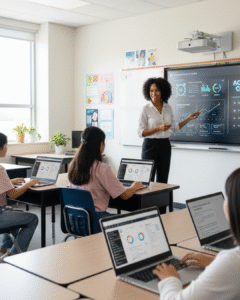AI in the Classroom: U.S. Teachers Pilot Academic Copilots
- Postado por Administrador Branner
- Categorias Uncategorized
- Data 9 de outubro de 2025
- Comentários 0 comentário
As artificial intelligence (AI) reshapes industries worldwide, education stands at the forefront of this technological revolution. Across the United States, teachers are leading the charge by piloting AI-powered academic copilots—digital assistants designed to personalize learning, streamline administrative tasks, and foster student engagement. This article explores how these new tools are transforming classroom experiences, the opportunities they present, and the challenges that lie ahead.

Embracing AI as Academic Copilots
In recent years, schools across the U.S. have begun to experiment with AI academic copilots—sophisticated platforms capable of supporting both teachers and students in real-time. These tools can adapt learning materials to individual student needs, recommending targeted exercises or offering instant feedback on assignments. For teachers, AI copilots help manage routine grading, create lesson plans, and identify students who may need extra support, freeing up valuable time for more personalized instruction.
The process of integrating AI in the classroom is often collaborative, with teachers participating as co-designers and testers. Through pilot programs, educators provide critical feedback to developers, shaping features to fit real-world classroom dynamics. This partnership ensures that AI tools are not just high-tech novelties, but practical assets that enhance the learning environment without undermining the teacher’s authority or creativity.
The adoption of academic copilots also sparks curiosity among students, many of whom are digital natives. Interacting with AI-powered chatbots or tutoring systems feels intuitive for today’s learners, who appreciate instant answers and customized resources. As a result, classrooms equipped with these tools often see increased engagement, with students more willing to participate, ask questions, and explore new topics at their own pace.
Opportunities for Personalized Learning
One of the most significant benefits offered by AI copilots is the potential for true personalized learning. Traditionally, teachers are tasked with meeting the diverse needs of students within a single curriculum—a challenge even for the most experienced educators. AI can analyze student performance data in real-time, identifying gaps in understanding and adjusting instruction accordingly. For instance, an AI copilot might suggest additional math practice for one student while offering enrichment activities to another who is ready to advance.
This level of personalization can be especially transformative for students who struggle with traditional instruction. AI copilots provide tailored scaffolding, ensuring that no student falls behind due to a lack of individualized attention. Teachers, in turn, are empowered to focus on higher-order tasks, such as facilitating discussions, mentoring, and fostering critical thinking, rather than being overwhelmed by administrative work.
Moreover, as AI copilots gather and interpret data on student progress, they can generate actionable insights for teachers and parents alike. These data-driven reports enable more nuanced conversations about learning goals, strengths, and areas that require improvement. Ultimately, this collaborative approach to education helps create a more supportive and responsive learning environment for every student.
Navigating Challenges and Ethical Considerations
While the promise of AI in the classroom is immense, it brings with it a host of challenges and ethical questions. Ensuring student data privacy is paramount, as AI copilots often handle sensitive information about academic performance and personal details. Schools must work closely with technology providers to implement robust safeguards, clear consent protocols, and transparent data use policies to protect students’ rights.
Additionally, there is a risk that overreliance on AI could diminish the human element that is so crucial to effective teaching. Teachers must remain at the center of the learning process, using AI copilots as supportive tools rather than replacements. Ongoing professional development is essential to help educators integrate AI thoughtfully and maintain a healthy balance between technology and personal connection.
There are also equity concerns to address, as not all schools have equal access to the latest AI technologies. Without careful planning and investment, the digital divide could widen, leaving underserved communities at a disadvantage. Policymakers, school leaders, and educators must work together to ensure that the benefits of AI copilots reach every classroom, regardless of location or resources.
AI academic copilots are ushering in a new era of education, offering unprecedented opportunities for personalized learning, greater efficiency, and enhanced student engagement. As U.S. teachers pilot these innovative tools, their experiences and insights will shape the future of teaching and learning. While challenges remain, thoughtful integration of AI promises to empower educators and students alike—ensuring that classrooms evolve to meet the needs of a rapidly changing world.
Você também pode gostar

School Choice Expands: What Changes for Families and Districts
Community Colleges Take the Lead in Workforce Reskilling
Community Colleges Take the Lead in Workforce Reskilling Deck: Short programs, flexible pathways, and local partnerships are closing the gap between training and jobs.By: Rafael Medeiros, Special ReporterDateline: Phoenix, Arizona — September 12, 2025 Community colleges—two-year institutions in nearly every …
